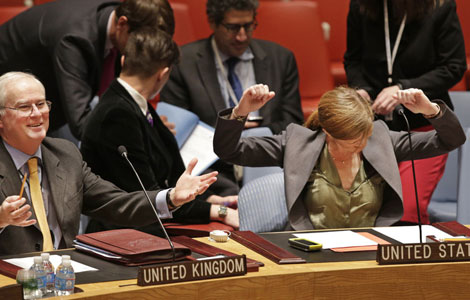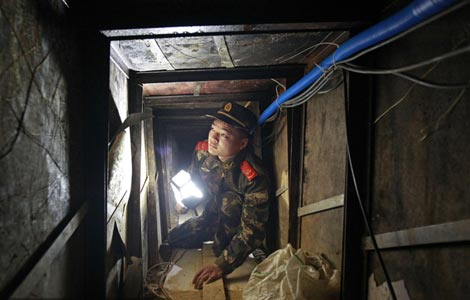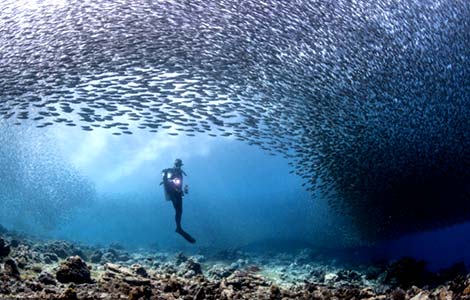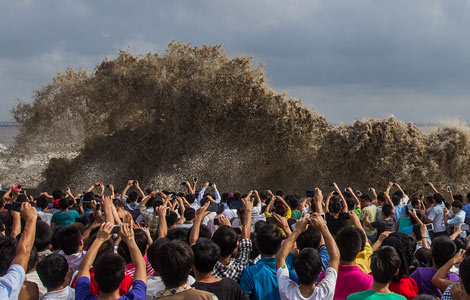Tokyo's global tour against China
Updated: 2013-12-26 02:01
By Zhang Yunbi (China Daily)
|
||||||||
Japan's PM has little chance of improving ties, analysts say
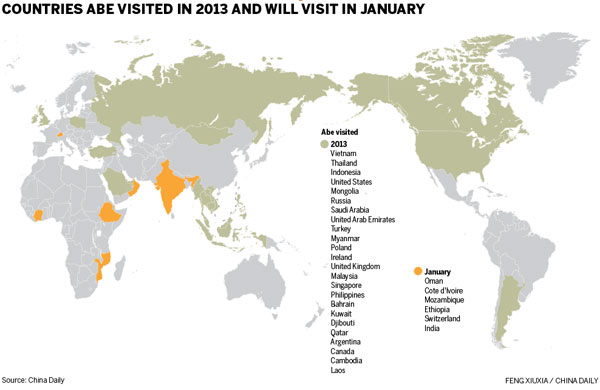 |
Japanese Prime Minister Shinzo Abe has demonstrated his New Year's diplomatic resolution with plans to visit at least six nations in Africa, the Middle East and Europe.
Tokyo may take the diplomatic moves to lobby countries to join Abe's effort to contain Beijing, and the strained relationship between the two nations will hardly improve because of Japan's surging military presence in the East China Sea, Chinese observers said.
His foreign visits starting Jan 9 may include Oman, Cote d'Ivoire, Mozambique and Ethiopia, and then Switzerland and India in late January, according to Japan's leading newspaper Sankei Shimbun.
In Abe's first year of his second term as prime minister, he has traveled abroad 13 times, covering more than 20 nations, and he has proposed policies to counter China when meeting top political figures, including those from the United States, France and all 10 Southeast Asian countries.
Zhang Boyu, deputy director of the department of Japanese political studies of the Institute of Japanese Studies at the Chinese Academy of Social Sciences, said that Abe's diplomacy in 2014 will be more persistent in pushing for policies that will encircle China.
"Following the diplomatic deadlocks this year with South Korea and China, Abe will hardly succeed in diplomacy in Northeast Asia next year," Zhang said.
"His trip to Africa — another component of his global strategies — will diversify Tokyo's diplomacy by securing more interest in energies."
Zhou Yongsheng, a Japanese studies professor at China Foreign Affairs University, said Abe will maintain his hawkish stance toward China, despite the great economic interdependence between the two neighbors, if another crisis takes place regarding China's Diaoyu Islands.
"The media have been busy running the scenario of China retaking islands in the East China Sea. Moreover, increasing Japan's deterrence of China has been publicly named as the chief goal of Tokyo's decisions to upgrade its armed forces and purchase cutting-edge weapons," Zhou said.
The Japanese Cabinet will accelerate the pace of its military buildup and diplomatic campaigns in 2014 to rebuild Japan's image as a political power in the world, analysts said.
Next year, Abe will break more ground in implementing policies because of the Cabinet's success in system building that removed institutional obstacles in 2013, analysts said.
Lian Degui, deputy director of the Japanese Studies Center at the Shanghai Institutes for International Studies, said Abe and his Cabinet have focused on centralizing power to build stronger security authorities and they will continue their hard-line policies.
A recently proposed regular ministers' meeting — gathering the prime minister, defense minister, foreign minister and chief Cabinet secretary — has become a policymaking pillar of Japan's National Security Council, which was established on Dec 4.
"Now more of the policymaking procedures have been placed under the command of the prime minister's office. Regional players will see Japan further flexing its muscles, and the situation in the East Asian region will hardly be stable," Lian said.
The overwhelming majority of the Liberal Democratic Party in both the upper and lower houses "have given Abe 'golden timing' for fulfilling his political pursuits in the following three years", Zhang said.
In his latest appearance on television, Abe expressed confidence that he'll face few political challenges in the next three years.
"Therefore, it is unlikely we will see Abe loosen the country's grip on military deployment regarding the East China Sea. We have seen the central government mobilize unprecedented manpower, financial budget and weapons to deal with conflicts concerning the islands," Zhang said.
Japan's defense budget draft released on Tuesday calls for $45.8 billion in spending in the fiscal year starting in April, up 2.2 percent from the current fiscal year, The Wall Street Journal reported.
Most Viewed
Editor's Picks

|

|

|

|

|

|
Today's Top News
Reform plans give US 'hope about trade'
GDP growth to hit 7.6% this year
Turkish ministers resign over corruption probe
Tokyo's global tour against China
Anti-graft campaign to receive key boost
Study quells fears of a baby boom
Vice president of university arrested
Headlines of Chinese economy to continue
US Weekly

|

|
